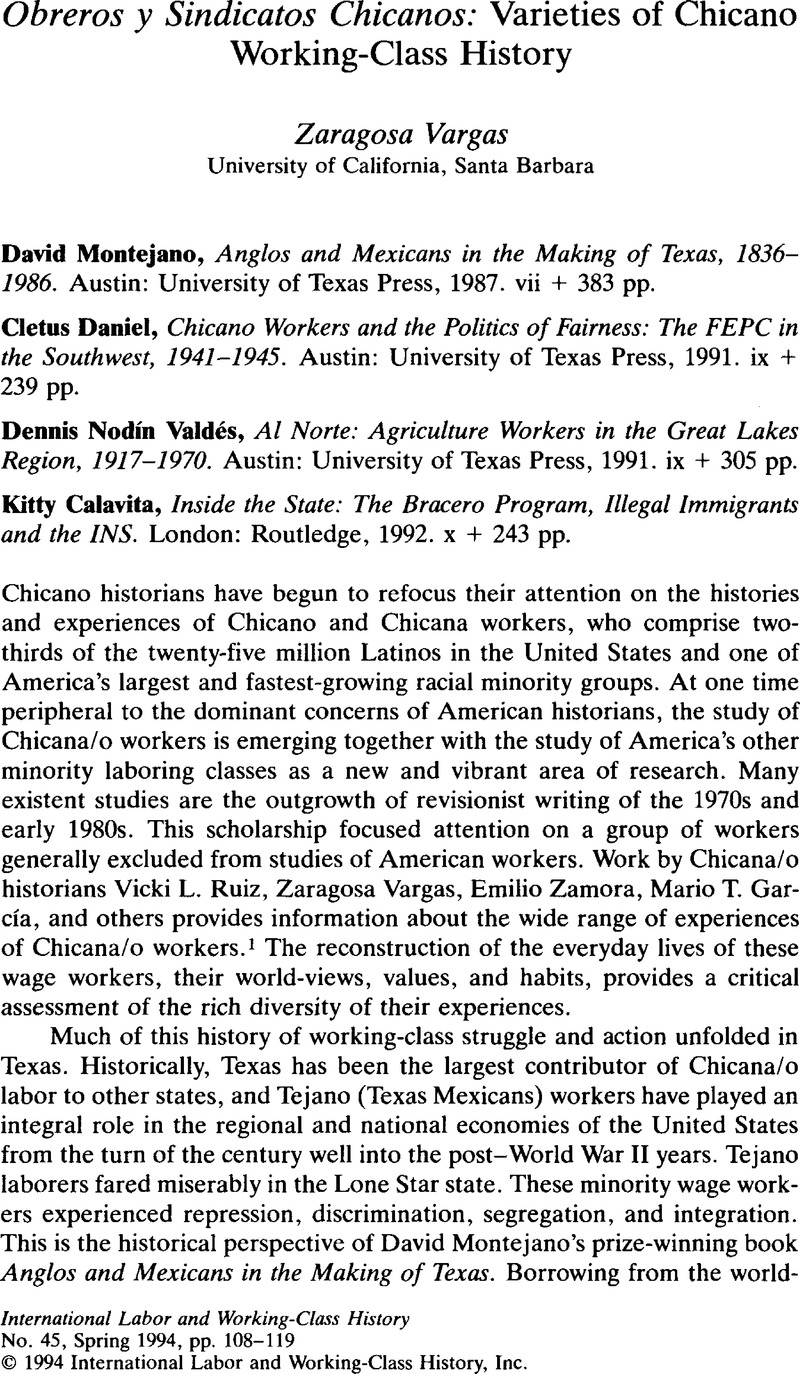No CrossRef data available.
Article contents
Obreros y Sindicatos Chicanos: Varieties of Chicano Working-Class History
Published online by Cambridge University Press: 16 December 2008
Abstract

- Type
- Review Essays
- Information
- Copyright
- Copyright © International Labor and Working-Class History, Inc. 1994
References
NOTES
1. Saragoza, Alex M., “Recent Chicano Historiography: An Interpretative Essay,” Aztlán 19 (1988–1990):1–78;Google ScholarGómez-Quiñones, Juan, “The Origins of the Mexican Working Class in the United States: Laborers and Artisans North of the Río Bravo, in El Trabajo y Los Trabajadores en la Historia de México, ed. Frost, Cecilia et al. , (Mexico and Tucson, 1980): 463–505;Google ScholarLamar, Howard R., “From Bondage to Contract: Ethnic Labor in the American West, 1600–1890,” in The Countryside in the Age of Capitalist Formation, ed. Hahn, Steven and Prude, Jonathan (Chapel Hill, 1986):293–324;Google ScholarRuiz, Vicki L., Cannery Women, Cannery Lives: Mexican Women, Urbanization, and the California Food Processing Industry, 1930–1950 (Albuquerque, 1987);Google ScholarVargas, Zaragosa, Proletarians of the North: Mexican Industrial Workers in Detroit and the Midwest, 1917–1933 (Berkeley, 1993);Google ScholarZamora, Emilio, The World of the Mexican Worker in Texas (College Station, Tex., 1993);Google ScholarGarcía, Mario T., Memories of Chicano History: The Life and Narrative of Bert Corona (Berkeley, 1994).Google Scholar
2. Miller, Hubert J., “Mexican Migration to the U.S., 1900–1920: With a Focus on the Texas Río Grande Valley,” Borderlands 7 (Spring 1984): 184.Google Scholar
3. Ibid., 186.
4. DeFreitas, Gregory, Inequality at Work: Hispanics in the U.S. Labor Force (New York,1991), 16;Google ScholarJiménez, María, “War in the Borderlands,” Report on the Americas 26 (07 1992):30.CrossRefGoogle Scholar
5. Zamora, World of the Mexican Worker in Texas, 133.
6. Ibid., 195–96; Rosenberg, Emily S., Spreading the American Dream: American Economic and Cultural Expansion, 1890–1945 (New York, 1982), 82–84.Google Scholar
7. DeFreitas, Inequality at Work, 15; Montgomery, David, The Fall of the House of Labor: The Workplace, the State, and American Labor Activism, 1865–1925 (Cambridge, 1987), 66;CrossRefGoogle ScholarMartinez, Oscar J., Troublesome Border (Tucson, 1988), 80–81;Google ScholarFoster, James C., ed., American Labor in the Southwest: The First One Hundred Years (Tucson, 1982), 157.Google Scholar
8. García, Mario T., Mexican Americans: Leadership, ideology & Identity, 1930–1960 (New Haven, 1989), 176.Google Scholar
9. Gómez-Quiñones, Juan, Chicano Politics: Reality & Promise, 1940–1990 (Albuquerque, 1990), 35–40.Google Scholar
10. García, Mexican Americans, 182.
11. Ibid., 186–89.
12. White, Richard, “It's Your Misfortune and None of My Own”: A New History of the American West (Norman, Okla., 1991), 592–93;Google ScholarMoody, Kim, An Injury to All: The Decline of American Unionism (New York, 1988), 23–24.Google Scholar
13. Gómez-Quiñones, Chicano Politics, 51; Garcia, Mexican Americans, 204–12; idem, “Working for the Union,” Mexican Studies/Estudios Mexicanos 9 (Summer 1993):242. ANMA was dedicated to gaining civil and economic rights for Mexican Americans and toward this end developed coalitions with other racial and ethnic minorities and with progressive organizations like the Civil Rights Congress. In light of the anticommunist hysteria and resulting domestic repression, ANMA appealed to the United Nations Commission on Human Rights to investigate the dismal plight of Mexican immigrant farm workers and publicly opposed the Korean War conflict and U.S. support for Latin American dictorships and interventions in Guatamala and the Middle East. Red-baited as a subversive group, ANMA soon lost credibility.




